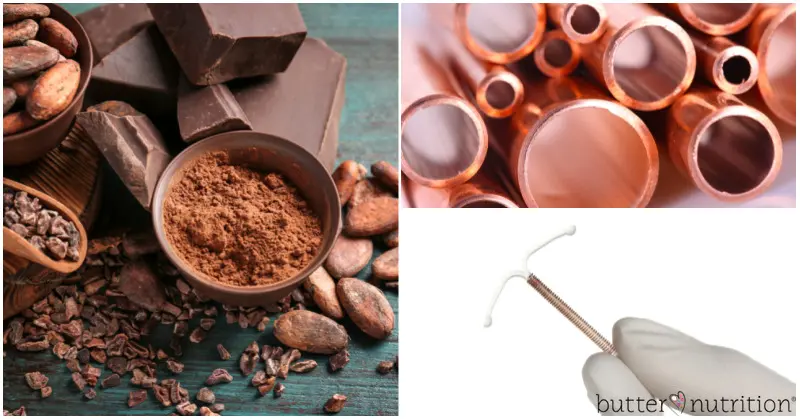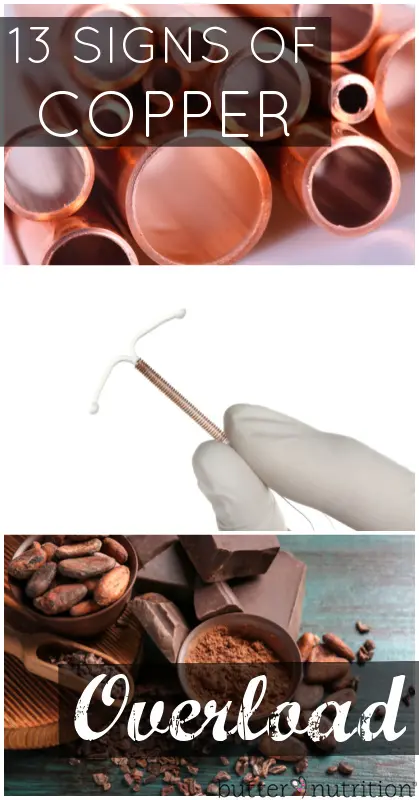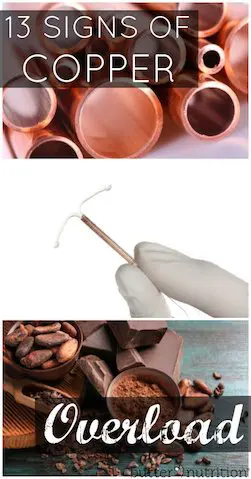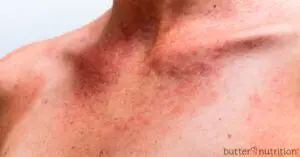
Balancing copper to prevent copper overload can be a delicate process in today's modern world, especially among high estrogen females.
Copper is a mineral, a metal and an essential nutrient that impacts neurotransmitters in the brain. Specifically, copper lowers dopamine levels (think pleasure and reward centers in the brain) and increases the neurotransmitter norepinephrine, which acts as a stress hormone.
In order for the copper you take in to be used by your body and enter your cells it needs special binding proteins, specifically metallothionein and ceruloplasmin. These binding proteins make the copper bio-available so it can be used by your body.
Getting Too Much Copper
Getting too much copper can decrease energy levels though adversely impacting thyroid activity, as well as mental well-being. Other symptoms include:
- irritability
- headaches and migraines
- hyperactivity
- academic underachievement
- skin sensitivity to rough fabrics and metals
- sensitivity to food dyes
- sleep issues
- high anxiety
- ringing in ears
- adverse reactions to copper (including multivitamins, chocolate, shellfish)
- estrogen intolerance
- poor stress control
- premature graying of hair
- abnormal menstrual cycles
- hair thinning/loss
- depression and postpartum depression
- difficulty focusing on tasks
How Copper Overload Happens
Copper overload can manifest for a variety of reasons, one strong influence being the antagonistic relationship between copper and zinc. When zinc is depleted by stress, dietary insufficiency or malabsorption, copper can increase. Other contributing factors include:
- estrogen dominance (estrogen lets copper levels rise)
- hormonal birth control or hormone replacement therapy
- copper IUD
- high copper diet
- low zinc diet resulting in low zinc levels
- pyrroles disorder
- chronic stress (depletes zinc levels, increasing copper)
- genetic predisposition and/or nutrient inheritance
- vegetarian and vegan diets (high in copper, low in zinc)
- a deficiency of copper-binding proteins
High Copper and Cancer Link
The data associating higher than normal copper to various cancers is strong.
Elevated copper levels have been found to be associated with cancer progression — "Numerous studies in the literature have reported that both the serum and tumor copper levels are elevated in a variety of malignancies, including both solid tumor and blood cancer. Further, the elevated copper levels have been shown to be directly correlated to cancer progression."
Another study concludes that high serum copper levels could increase the risk of lung caner while others link high levels to various cancers, "The levels of copper in blood and tissues are significantly elevated in various types of cancer patients, including liver cancer, colorectal cancer, lung cancer, and breast cancer."
Copper deletion has even been used as a viable therapy in breast cancer, "Copper depletion has emerged as a viable cancer therapeutic approach in breast cancer due to increased cellular uptake by malignant cancer cells and reliance on copper-dependent signaling pathways."
Sources of Copper
Copper is pretty easy to find in the diet, especially for those who are on paleo-type diets that are avoiding grains and instead loading up on large amounts of nuts, seeds and chocolate. These foods also tend to be over emphasized in 'wellness culture,' making zinc to copper imbalances commonplace.
Some of the most common copper sources are:
- multivitamins
- other copper-containing supplements (it's important to note that taking high doses of copper is well-linked to liver injury)
- copper IUD
- old copper pipes contaminating drinking water
- shellfish
- dark chocolate
- shiitake mushrooms
- nuts/seeds, especially almonds, cashews and sunflower seeds
- avocados
- copper sulfate anti-algae agents used in some swimming pools/jacuzzis
Types of Copper
Evaluating copper levels can be confusing because there are different forms of copper. If you just measure one component of copper, you're only getting half of the story on your true copper levels and overall copper homeostasis.
- Free copper is copper not bound to copper binding proteins. When over 25% of copper is free or unbound this can create metal metabolism disorder, and leads to copper issues. This is because free copper acts as a free radical, leading to oxidative stress.
- Bio-available copper - in healthy, copper-balanced persons, approximately 80-95% of copper is bound to ceruloplasmin, with only 5-20% of copper being 'free' or 'unbound.'
To make things even more confusing, one can have copper overload (too much free or unbound copper) and be copper deficient (not enough bio-available) copper at the same time.
Testing for complete copper status can be measured using blood testing (available to my US clients) that includes serum copper and plasma zinc paired with hair tissue mineral analysis (available to worldwide clients). It's also important to have someone familiar with copper overload and optimal lab ranges (not the standard ones provided by the lab) so any imbalances don't get missed or overlooked.
This testing is standard with my clients in my 1-1 programs.
Correcting Copper Overload
Correcting copper overload takes a multifaceted approach including dietary and supplement strategies.
As well as reducing excess high-copper foods (and supplements) from the diet, nutrients important to counteract copper high copper include:
- zinc
- vitamin b6
- vitamin C
- molybdenum
- niacin [10]
I hope this post better helps you understand a not-so-commonly known nutrition imbalances that can have a huge impact on how you feel and empowers you to discover ways to feel better.
Have you struggled with copper overload? Please share in the comments!
References:
- Walsh, William J., PhD: Nutrient Power: Heal Your Biochemistry & Heal Your Brain, 2014.
- https://www.traceelements.com/Docs/Nutrient%20Interrelationships-Minerals-Vitamins-Endocrines.pdf
- https://www.traceelements.com/Docs/The%20Nutritional%20Relationships%20of%20Copper.pdf
- https://www.cancertreatmentreviews.com/article/S0305-7372(08)00261-2/fulltext
- https://www.ncbi.nlm.nih.gov/pmc/articles/PMC6300955/#:~:text=Conclusions,the%20development%20of%20lung%20cancer.
- https://www.nature.com/articles/s41467-021-27559-z
- https://www.frontiersin.org/journals/oncology/articles/10.3389/fonc.2023.1209156/full#:~:text=The%20levels%20of%20copper%20in,the%20blood%20return%20to%20normal.
- https://erc.bioscientifica.com/downloadpdf/journals/erc/11/2/15163301.pdf?pdfJsInlineViewToken=183877275&inlineView=true
- https://www.ncbi.nlm.nih.gov/books/NBK548090/
- https://www.traceelements.com/Docs/News%20March-April%2089.pdf







Jen and Christian
I love your info ! It is spot on with what my naturopath dr is doing with me currently ! I hope woman realize how they can get help and feel better with all this info 😊
Catherine
Thanks Jen for the kind words. Glad you've found the source of your symptoms!
Abundantly,
Catherine